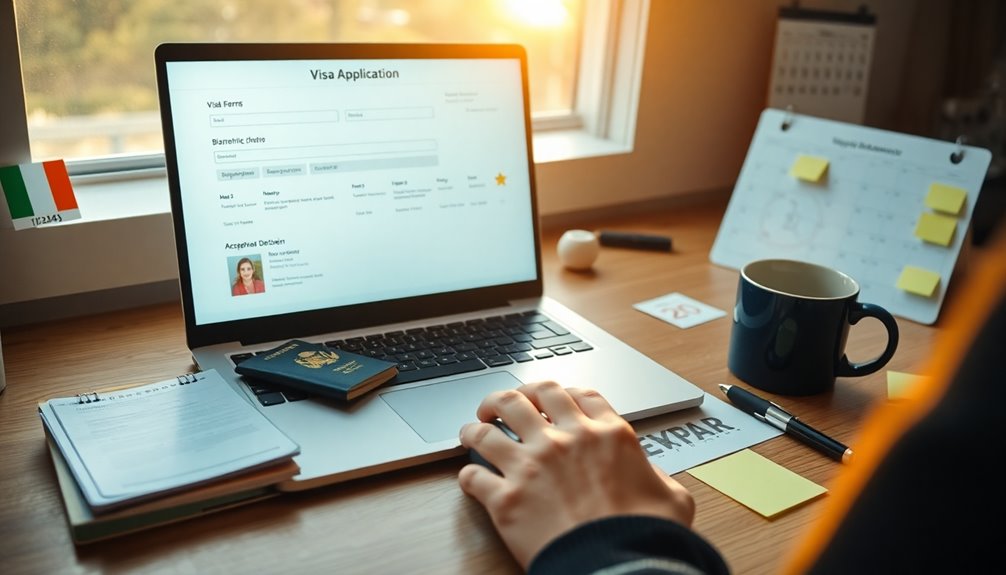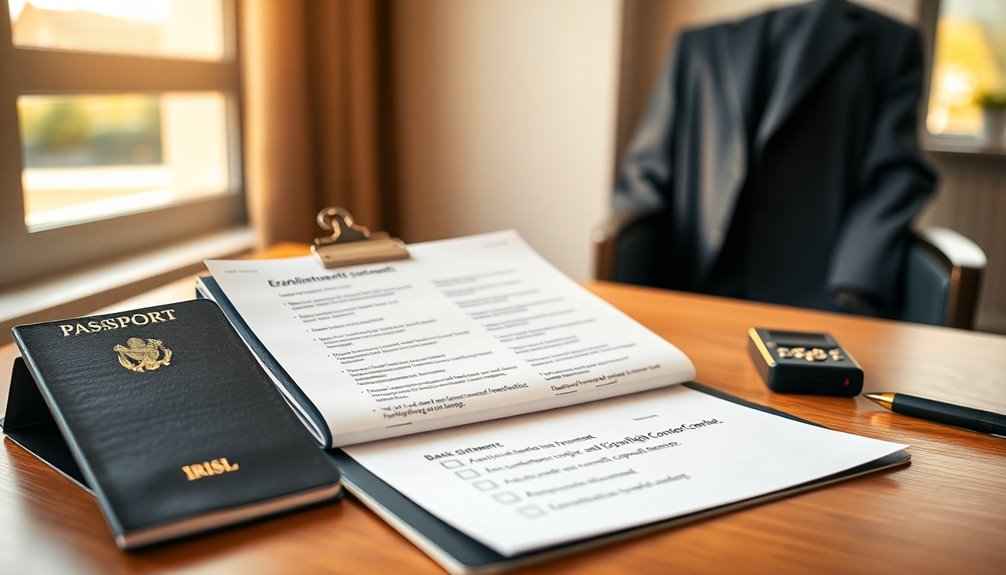
You’ll choose Ireland for quality English teaching and a friendly, English-speaking setting that helps you practice daily. First, check if your nationality and course length need a student visa — most courses over 90 days do. Pick an approved school, gather your passport, acceptance letter, proof of funds, insurance and accommodation details, then complete the online application and prepare for registration with immigration after arrival. Follow these steps and you’ll be ready to learn more about each requirement.
Highlights
- Check if your nationality and course length require a student visa on the Irish immigration website.
- Obtain an official course offer letter and confirm the school’s registration with Irish authorities.
- Gather required documents: passport, photos, proof of funds, travel insurance, accommodation, and acceptance letter.
- Submit the visa application promptly, keep copies, and track the application status online.
- Register with the Garda National Immigration Bureau within 90 days of arrival and keep original documents ready.
Why Choose Ireland for English Language Study
Because Ireland blends high-quality language teaching with a friendly, English-speaking environment, you’ll improve your skills both in and out of the classroom. You’ll find cultural immersion everywhere — cafes, community events, and homestays — so you practice naturally and confidently. Courses offer quality education with flexible options, letting you pick intensity and focus that match your goals. You’ll gain practical communication skills, local insights, and freedom to explore at your own pace. Support services help with accommodation and social activities, so you can travel, study, and grow without unnecessary barriers. Ireland makes learning efficient, enjoyable, and liberating.
Determining If You Need a Student Visa
Wondering whether you need a student visa to study English in Ireland? Check your nationality first: some countries’ citizens can enter visa-free for short stays, while others must apply. Review official visa requirements and eligibility criteria on the Irish immigration website to confirm duration limits and course types covered. If your course is longer than the visa-free stay or you’re from a visa-required country, you’ll need a student visa. Also consider work permissions and renewals if you want flexibility. Keep documents ready—offer letter, funds proof, passport—and confirm timelines so your plans stay free and on track.
Selecting an Approved English Language School
When choosing an English language school in Ireland, focus first on accreditation and course approval so you know the provider meets national quality and visa requirements. You’ll want to pick from accredited institutions listed by Ireland’s quality agencies and recognised bodies; that assures course accreditation and consistent standards. Check course length, intensity, and whether the school supports visa paperwork. Read reviews, confirm adult-friendly policies, and ask about student support services—housing, orientation, and emergency contacts. Choose a school that’s transparent, offers flexible scheduling, and empowers your independence so you can learn confidently while planning your stay.
Document Checklist for Your Visa Application
You’ll need a concise packet of documents to support your Irish student visa application—these prove your identity, course enrolment, finances, and plans while in Ireland. Gather passport, passport-sized photos, and proof of English course acceptance from an approved school. Include evidence of funds (bank statements, scholarship letters), travel insurance, and accommodation details. Add a clear travel itinerary and a brief personal statement explaining study goals and intention to return home. Check specific document requirements on the official site and make certified translations where needed. Keep originals and neat copies ready so your visa application proceeds smoothly and confidently.
How to Complete the Online Visa Application Form

Now that your documents are organised, you can start filling in the online visa application form—this is where those papers get matched to your answers. Follow a form completion guide: have PDFs ready, enter names exactly as on passports, and double-check dates. Use online application tips like saving drafts, using a stable connection, and avoiding autofill errors. Be honest and concise in supporting statements; match course dates and fees to your documents. Review every section before submitting, correct inconsistencies, and download a copy for your records. This keeps your application clean, reliable, and aligned with your goal of studying freely.
Paying Fees and Booking Your Biometrics Appointment
You’ll need to pay both your course fees and the visa application fee before your appointment, so confirm accepted payment methods and keep receipts. After payment, book your biometric appointment as soon as dates are available—slots can fill quickly. Bring proof of payment to the appointment and double-check the location, documents required, and arrival time.
Paying Course and Visa Fees
Before you can finalise your student visa application, you’ll need to pay the course tuition and the Irish visa fee, and then book your biometrics appointment — each step has deadlines and specific payment methods, so follow the provider’s instructions exactly. Pay your course payment by the method the school specifies (bank transfer, card, or portal), keep receipts, and confirm enrollment once payment clears. For visa fees, use the official Irish immigration payment channels and save transaction records. Meeting payment deadlines protects your place and your freedom to travel. Contact your provider promptly if anything goes wrong.
Scheduling Biometric Appointment
Once your course and visa fees are confirmed, it’s time to book your biometrics appointment — this step is mandatory for most student visa applicants and must be done within the timeframe your visa instructions specify. You’ll follow the biometric process online, pay any separate service charge, and choose a convenient appointment location from the provided list. Pick a slot that fits travel plans and gives you flexibility if a reschedule’s needed. Bring required ID, your visa fee receipt, and any forms listed. Arrive early, stay calm, and remember this short step grants you your freedom to study in Ireland.
Preparing for Your Visa Interview and Supporting Evidence

Although interviews for student visas to study English in Ireland can feel formal, you can prepare methodically to reduce stress and present your case clearly. Focus on visa interview preparation: rehearse concise answers about your course choice, study plans, and intentions to return home. Organize supporting document requirements so originals and copies are easy to access—acceptance letter, ID, proof of course fees, accommodation details, and travel itinerary. Dress neatly, arrive early, and stay calm. Speak truthfully, confidently, and briefly. If asked about finances or health, answer directly but don’t overexplain; let documents speak for you.
Health Insurance and Financial Proof Requirements
Because health coverage can affect both your wellbeing and visa outcome, you’ll need to show clear proof of adequate insurance and available funds. You should compare health insurance options — EU-scheme eligibility, private student plans, or coverage through your school — and pick one that gives extensive medical and repatriation benefits. For financial documentation, provide recent bank statements, sponsor letters, and proof of tuition payment or access to living-cost funds. Keep originals and certified translations ready. Being organized lets you travel with confidence and freedom, knowing you meet visa rules and can handle unexpected medical or financial needs abroad.
Receiving a Decision and Next Steps Before Travel
Once you get your visa decision, check the approval letter carefully for any conditions or expiry dates. Before you travel, use a pre-departure checklist to confirm flights, accommodation, insurance, and documents are in order. On arrival, make sure you register with your school and local immigration if required so you’re set to start your course.
Visa Decision Received
When you get the visa decision, check it carefully right away so you know whether you’re approved, refused, or need to provide more information; this will determine the exact next steps before travel. If approved, confirm visa dates, entry conditions and passport return timing, and note any restrictions. If refused, read the refusal reason and deadlines for appeal or reapplication; use application updates and visa processing times to plan a prompt next move. If asked for more documents, respond quickly and keep proof of submission. Stay organized, keep copies, and contact your school or visa office if anything’s unclear.
Pre-Departure Checklist
Now that you’ve got the visa decision, it’s time to prepare for travel with a focused pre-departure checklist so nothing important gets missed. Check your visa details, passport validity, and any entry conditions. Book flights and basic accommodation, noting flexible tickets where possible. Arrange travel insurance, health records, and prescribed medications with documentation. Prepare finances: notify banks, get some euros, set up a travel card. Pack smart: copies of documents, chargers, appropriate clothing, and a small first-aid kit. Confirm course start dates and contact details. These pre departure essentials will make your travel preparations calmer and freer.
Arrival and Registration
After you’ve received your visa decision and packed your essentials, the next steps focus on arrival logistics and registering with Irish authorities so you can start your course without delays. On arrival, follow airport arrival procedures: immigration checks, passport stamp, and collect baggage. Keep your visa letter, acceptance letter, and proof of funds handy. Within 90 days, complete registration requirements with the Garda National Immigration Bureau (GNIB/IRP) to get your residence card. Book appointments early, bring original documents and proof of address. Do this promptly so you’re free to settle, attend orientation, and begin learning with confidence.
Entering Ireland and Registering With Immigration
Although you’ll likely feel tired after your flight, it’s important to move straight to immigration control and have your passport, visa stamp (if issued), letter of acceptance from your school, proof of funds, and return ticket ready to show; doing so speeds up processing and reduces the chance of secondary questioning. After entry, follow the immigration process: collect any entry stamp and keep documents safe. Within the registration requirements period, book an appointment with your local immigration office to get your permission card (IRP). Bring originals, photocopies, and proof of address. Stay calm, ask questions, and keep copies for freedom and peace of mind.
Extending Your Stay or Switching Permission While Studying
If you need more time in Ireland, you can apply to extend your Stamp 2 permission—start the process well before your current stamp expires. If you’re finishing a degree and meet the criteria, you might be eligible to apply for Stamp 1G for job-seeking or employment after graduation. Also know that changing course or provider has specific visa and registration implications, so check requirements and notify immigration promptly.
Extending Stamp 2 Permission
While you’re studying on Stamp 2, you can usually extend your permission if your course is longer than originally approved or if you need more time to complete studies, but you must apply before your current permission expires and meet the Immigration Service conditions. To get a Stamp 2 Visa Extension, gather an updated letter from your school confirming course details, proof of funds, and passport pages. Apply online through INIS/IRP procedures, pay fees, and follow guidance on biometrics if required. Don’t overstay: timely application preserves your freedom to study and travel while you wait for a decision.
Applying for Stamp 1G
Once you’ve sorted a Stamp 2 extension for your course, you may be wondering about staying longer after graduation or changing your permission to work — that’s where Stamp 1G comes in. You can apply if you’ve successfully completed an eligible degree or higher diploma and meet stamp 1g requirements like holding valid immigration permission and applying within the time limits. Stamp 1g benefits include open employment access and time to seek longer-term options. Prepare documents, timely APS attendance, and clear proof of qualification. It’s a practical route to freedom after study, so plan deadlines and submit accurately to avoid delays.
Changing Course or Provider
Because your course or circumstances may change, you can switch programmes or providers without immediately leaving Ireland — but you’ll need to follow the correct steps to keep your immigration permission valid. You should inform Immigration and your current provider, get written confirmation of enrolment cessation, and secure an offer and registration from the new provider. For changing courses, check visa conditions and whether course level or duration affects permission. For provider transfers, make certain the new college reports your registration to INIS and that you apply to vary your visa if required. Act promptly so your freedom to study isn’t interrupted.
Some Questions Answered
Can I Work Part-Time While Studying an English Course in Ireland?
Yes — you can do part time employment while studying, but check visa rules and provider limits first. You’ll want to balance work with student responsibilities so coursework and attendance don’t suffer. Pick flexible shifts or freelance gigs that let you stay free to travel and learn. Keep records, know tax and hours limits, and communicate with your school if workload spikes. Prioritise studies while enjoying extra income and independence.
Do English Course Visas Allow Family Members to Accompany Me?
No — English course visas generally don’t let family accompany you. You’ll need to check the visa application process and family member eligibility rules, but short-term language course visas usually don’t grant dependents permission to join. If you want family with you, look into longer-term study options or different visa categories that allow dependents, and prepare supporting documents showing family member eligibility before applying.
What Happens if My English School Closes During My Course?
Something unexpected can happen—stay calm. If your school closure affects your course, you’ll need to act quickly: contact the school for closure documentation, notify immigration about the situation, and find a new registered English provider. These steps manage school closure and visa implications so your permission to stay isn’t jeopardized. Keep records, seek legal or college-adviser help, and choose a replacement course that matches visa requirements to maintain your freedom to continue studying.
Can I Switch to a Degree Program Without Leaving Ireland?
Yes — you can often switch to a degree program without leaving Ireland, but you’ll need to meet visa requirements and program eligibility. You’ll apply to a recognized college, get an acceptance letter, and submit a new visa or permission application showing finances, health insurance, and course details. Check immigration timelines and avoid overstaying. Stay proactive: consult your college’s international office and Irish immigration to guarantee a smooth changeover.
Are There Language Proficiency Tests Required Before Arrival?
Yes — you’ll usually need to meet language requirements before arrival, often via IELTS, TOEFL or equivalent. Some institutions offer test exemptions if you’ve studied previously in English or hold certain nationalities. Check your college’s specific policy and ask admissions for acceptable proof; they’ll tell you whether a waiver applies or if you must sit a test. Plan ahead so you’re free to focus on travel and settling in.
Summing Everything Up
You’ve got this—follow the checklist, pick a recognised school, and submit accurate documents so the process runs like clockwork. Keep proof of funds and health cover handy, register promptly on arrival, and know your options for extending or changing permission. Treat each step as a bridge rather than a hurdle: preparation makes the crossing steady. If you stay organised and ask for help when needed, your Ireland study experience will unfold smoothly.
